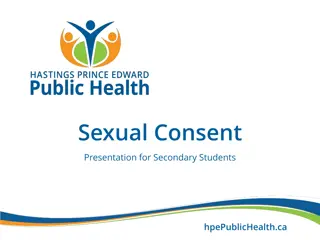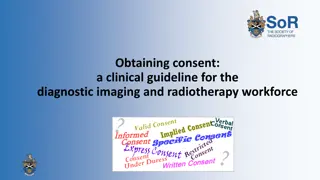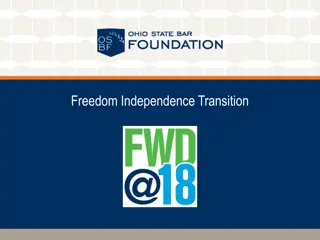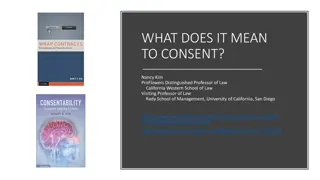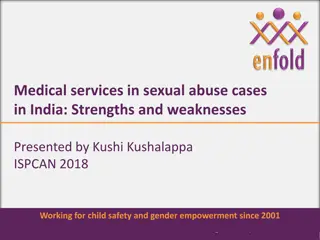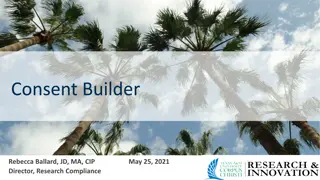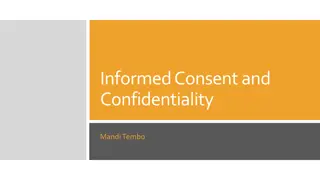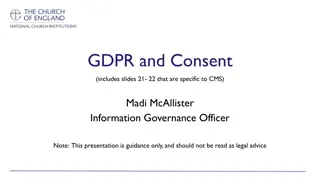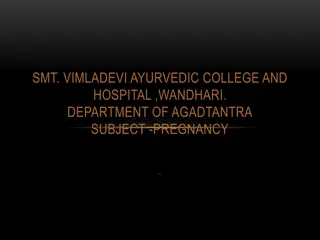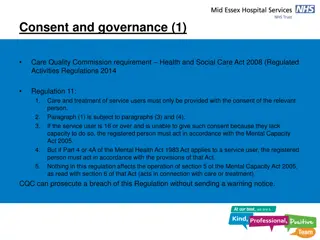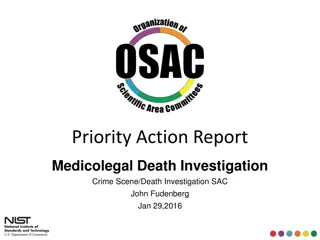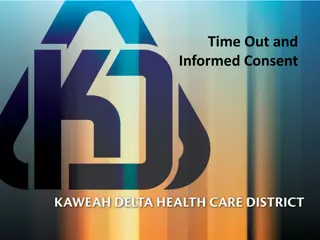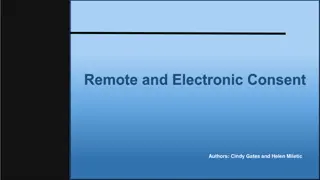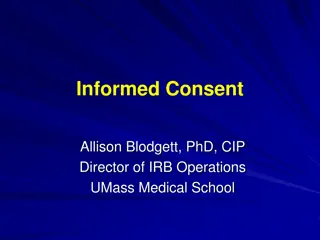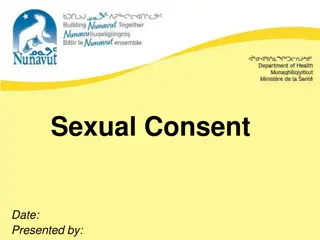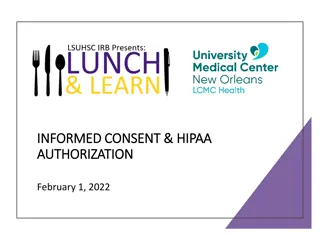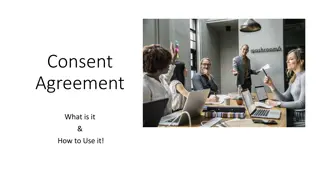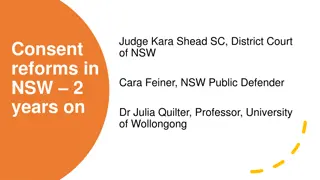Understanding Medicolegal Aspects of Consent in Medical Practice
Consent in medical practice is crucial, serving as a defense against liability. The Nuremberg Code emphasizes voluntary informed consent. Patients have rights to autonomy, and doctors must respect these by obtaining valid consent before treatment. The doctor-patient relationship has evolved due to technological advancements, empowering patients to make informed decisions about their healthcare.
Uploaded on Sep 14, 2024 | 0 Views
Download Presentation

Please find below an Image/Link to download the presentation.
The content on the website is provided AS IS for your information and personal use only. It may not be sold, licensed, or shared on other websites without obtaining consent from the author. Download presentation by click this link. If you encounter any issues during the download, it is possible that the publisher has removed the file from their server.
E N D
Presentation Transcript
MEDICOLEGAL ASPECTS OF CONSENT Dr. Punit D Ghetia Consultant Intensivist Bankers Heart Institute
CONSENT Consent refers to the provision of approval or agreement, particularly and especially after thoughtful consideration and understanding As per jurisprudence prior provision of consent signifies a possible defense (justification) against civil or criminal liability by the doctor. Practitioners who use this defense and claim that they should not be held liable for a crime, as the consequence in question occurred with the prior consent and permission of the patient without realising whether it is a commission or an omission and the extent of negligence
MEDICAL CONSENT Consent is one of the critical issues in the area of medical treatment. The earliest expression of this fundamental principle, based on autonomy, is found in the Nuremberg Code of 1947 The Nuremberg Code was adopted immediately after World War II in response to medical and experimental atrocities committed by the German Nazi regime The code makes it mandatory to obtain voluntary and informed consent of human subjects.
Similarly, the Declaration of Helsinki adopted by the World Medical Association in 1964 emphasizes the importance of obtaining freely given informed consent for medical research. Medical Council of India (MCI) has laid down guidelines that are issued as regulations in which consent is required to be taken in writing before performing an operation. The MCI guidelines are applicable to operations and not cover to the extent other treatments or procedures These are covered under Implied and expressed consent.
MEDICAL CONSENT Consent is perhaps the only principle that runsthrough all aspects of health care provisions today. It also represents the legal and ethical expression of the basic right to have ones autonomy and self-determination. If a medical practitioner attempts to treat a person without valid consent, then he will be liable under both tort and criminal law. Patient must give valid consent to medical treatment; and it is his prerogative to refuse treatment even if the said treatment will save his or her life.
LAW AND MEDICAL CONSENT The rights (autonomy) of the patient have deeply eroded the old model of doctor-patient relationship. Doctors are no more Gods . There have been significant changes in the doctor patient relationship with the advancement of technology in day-to- day practice. More and more patients are becoming aware of their rights and are keen to make free choice and decision on their treatment. This helps them to choose the treatment of their choice from the options available and to select a physician of their choice
Informed consent was practically non-existent till the time COPRA (Consumer Protection Act) came into existence. This is seen as more of a legal requirement than an ethical moral obligation on part of the doctor towards his patient. The patient has now the ability to select or dismiss their doctors and to choose the treatment of their choice from the options available. Important aspect of several Medical Consumer litigations is improper consent .
CONSENT AND MEDICAL PRACTICE There exists a duty to obtain prior consent (with respect to living patients) for the purpose of diagnosis, treatment, organ transplant, research purposes, disclosure of medical records, and teaching and medico-legal purposes. With respect to the dead with regard to pathological autopsy, organ transplant (for legal heirs), and for disclosure of medical record, it is important that prior informed consent of the patient, or relative is obtained after death.
CONSENT AND MEDICAL ETHICS The Hippocratic Oath prevalent for centuries has granted doctors the right to decide in the best interest of the Patient. But the same has been conflicted with the trend of twentieth century right of freedom to control health as well as avoiding non-consensual medical treatment. Clinical ethics teaches physicians, a wide range of specific ethical issues. Informed consent, truth telling, End-of-life decisions, Advance directives (substitute decision making for incompetent patients) Emergency consent
Landmark decision regarding information in concent : The Supreme Court has recently published its judgment in the case of Montgomery v Lanarkshire Health Board. The case, involving allegations in relation to birth-related injuries, has attracted a lot of publicity also highly significant in medico-legal terms in that it crystallizes the law in relation to consent more specifically issues around the amount of information a patient is entitled to be told before making a treatment decision. Briefly, Mrs Montgomery s son was born after a failure of the head to descend due to shoulder dystocia, necessitating forceps delivery aided by symphysiotomy. Twelve minutes passed between the head appearing and delivery, during which time the cord was completely or partially occluded. After birth her baby was diagnosed with significant cerebral palsy.
Mrs Montgomerys grounds for alleging negligence were i) she should have been given advice regarding the risk of shoulder dystocia, being just over 5 feet tall and diabetic, and ii) it was negligent not to perform a Caesarean section when abnormities were noted on the CTG. The main focus of the appeal was on the issues of the information given to Mrs Montgomery when she had expressed concern about being able to delivery her baby vaginally though she had not asked specific questions regarding shoulder dystocia. Initially she had lost her case both at trial and on appeal. She then took her case to the Supreme Court where she was successful and her appeal allowed.
This case is important to all doctors involved in consent discussions with patients as it sets out very clearly what is expected in terms of information disclosure: the focus being on matters the patient would regard as significant which may not be the same as the doctor s opinion. The key statement in the judgment pull together previous case law and guidance is that move away from non-disclosure of a riskbased on percentages: ... it follows that the assessment of whether a risk is material cannot be reduced to percentages. The judgment also states that it cannot be left to the doctor to determine what is reasonable to disclose; the move is to what a patient would attach importance to. In addition, the Courts have the final say in determining the nature and extent of a person s rights .not the medical professions.
At paragraph 87 the judgment states: An adult person of sound mind is entitled to decide which, if any, of the available forms of treatment to undergo, and her consent must be obtained before treatment interfering with her bodily integrity is undertaken. The doctor is therefore under a duty to take reasonable care to ensure that the patient is aware of any material risks involved in any recommended treatment, and of any reasonable alternative or variant treatments. The test of materiality is whether, in the circumstances of the particular case, a reasonable person in the patient s position would be likely to attach significance to the risk, or the doctor is or should reasonably be aware that the particular patient would be likely to attach significance to it. The patient does not have to ask specific questions and it has been pointed out that it is unreasonable to expect a lay person to know what questions to ask - but if they are expressing some concerns the questions which would naturally flow from those concerns must be explored and answered fully.
There are some exceptions: where the patient has made it clear they do not wish to be informed of risks of injury, where the disclosure would (in the reasonable exercise of medical judgment) be seriously detrimental to the patient s health, and in an urgent or emergency situation. Whilst this specific judgment is about an obstetric case, the principles apply to consent in all fields of practice. The judgment makes specific comment about what is expected in the dialogue with the patient and the doctor s role, it states: This role will only be performed effectively if the information provided is comprehensible. The doctor s duty is not therefore fulfilled by bombarding the patient with technical information which she cannot reasonably be expected to grasp, let alone by routinely demanding her signature on a consent form.
All doctors involved in discussions with patients about consent will therefore need to be sufficiently well-informed and trained in how to obtain fully informed consent. They must be able to identify when a patient may need more information in order to make a decision about the treatment they agree to have. The judgment runs to 38 pages and clearly this blog provides only the briefest commentary but at paragraph 107 the message is very clear: This case has provided us with the opportunity, not only to confirm [that the need for informed consent was firmly part of English law], but also to make it clear that the same principles apply in Scotland. This judgment provides the stimulus for doctors to reflect on their practice regarding consent. As usual we would advise that members keep clear, relevant and unambiguous notes of consent discussions and carefully check any proformas or standard information leaflets that are in use.
1. INFORMED CONSENT: It is defined understanding, by a competent patient , of a plan for medical care after physician adequately discloses the proposed plan, its risks and benefits, and alternative approaches. The decision-making capacity is free from coercion or manipulation by the patient/doctor as voluntary acceptance after full : Informed consent must contain four vital components:-
COMPONENTS Mental capacity of the patient to enter into a contract (This also includes his ability to understand information given) Complete Information to be provided by doctor Voluntary acceptance of the procedure by the patient Should be person and the procedure specific
CONTENTS OF THE CONSENT: Condition (Disease) of the patient Purpose and Nature of intervention Consequences of such intervention Any alternatives available Risks involved Prognosis in the absence of intervention The immediate and future cost The knowledge regarding the intervention should be in an understandable language and format so that decision in the form of authorization by patient can be made.
ELIGIBILITY FOR CONSENT: Age Soundness of mind Ability to understand Remember the information given Ability to deliberate and decide the treatment choices Believes that the information applies to the said patient and specific purpose.
2. EXPRESSED CONSENT It may be oral or in writing Though both these categories of consents are of equal value, written consent can be considered as superior because of its evidential value. Oral: Oral consent should be taken in the presence of uninterested third party Mainly in cases where intimate examination of female is required. Tests necessitating removal of body fluids, radiological examination can be done after securing oral consent. Written: It is advisable to take written consent in the presence of disinterested third party (this third party is only to attest the signature of the patient). Consent should be taken in the patients own language. Written consent is mandatory in every invasive diagnostic/therapeutic procedures or any medico legal examination.
3. IMPLIED CONSENT: Implied consent may be implied by patients conduct. So it is basically the conduct of the patient when he comes to the doctor for examination / treatment. Doctor should remember that this is only for routine examination as well as treatment. This does not extend to the performance of intimate examination or diagnostic procedures. If there is slightest chance of any complication express consent should be taken. 4. TACITCONSENT: Tacit consent means implied consent understood without being stated. Usually the way a patient present him self for treatment imply consent.
5. SURROGATE CONSENT: This consent is given by family members for minors or dead. Generally, courts have held that consent of family members with the written approval of 2 physicians sufficiently protects a patients interest. 6. ADVANCE CONSENT : It is the consent given by patient in advance before death 7. PROXY CONSENT : It indicates consent given by an authorized person before or after death. If an unconscious patient brought by police from road and operation essential to save life 2 or 3 doctors to give consent by signing on consent form, preferably along with police. Informed consent obtained after explaining all possible risks and side effects is superior to all other forms of consent and legally defensive.
CONSENT PROFORMA I _____S/D/W of ______ aged __ address ______under the treatment of Dr______do hereby give consent to the performance of _____(procedure/treatment) and to the administration of _____(an aesthesia) upon myself/upon ____ aged __who is related to me as _____.The nature and purpose has been explained to me by Dr _______.I declare that I am more than 18 years of age. I have been informed that there are inherent risks involved in the treatment. No assurance has been given to me regarding the success of the treatment. I have given this consent voluntarily out of my free will without any pressure. Place: Date & Time: SIGNATURE I hereby declare that I have explained in detail regarding the case to the patient and answered all his queries to his satisfaction in a language that he could understand. Place: Date & Time: Signature of the Doctor
The importance of obtaining informed consent : In the case of Samira Kohli vs. Dr. Prabha Manchanda and Ors. I (2008) CPJ 56 (SC), the apex court held that consent given for diagnostic and operative laparoscopy and laporotomy if needed does not amount to consent for a total hysterectomy with bilateral salpingo opherectomy. The appellant was neither a minor nor mentally challenged or incapacitated. As the patient was a competent adult, there was no question of someone else giving consent on her behalf. The appellant was temporarily unconscious under anesthesia, and as there was no emergency. The respondent should havewaited until the appellant regained consciousness and gave proper consent. The question of taking the patient's mother's consent does not arise in the absence of emergency. Consent given by her mother is not a valid or real consent.
The question was not about the correctness of the decision to remove reproductive organs but failure to obtain consent for removal of the reproductive organs as performance of surgery without taking consent amounts to an unauthorized invasion and interference with the appellant's body. The respondent was denied the entire fee charged for the surgery and was directed to pay Rs. 25000/- as compensation for the unauthorized surgery. The question of taking the patient's mother's consent does not arise in the absence of emergency. Consent given by her mother is not a valid or real consent. The question was not about the correctness of the decision to remove reproductive organs but failure to obtain consent for removal of the reproductive organs as performance of surgery without taking consent amounts to an unauthorized invasion and interference with the appellant's body. The respondent was denied the entire fee charged for the surgery and was directed to pay Rs. 25000/- as compensation for the unauthorized surgery.
WHO CAN GIVE CONSENT Simple medical examination the minimum age of consent is 12 years. For consenting to have any major diagnostic or therapeutic procedure or surgery the age is above 18 years (I.P.C. Sections 87-93). The patient should be mentally sound and he/she should not be under any fear or threat or any false conception. The patient should not be intoxicated or sedated. Incomplete information about the patient s diagnosis, therapeutic plan etc. is acommission than misconception of omission.
CONSENT REQUIRED i) Some body else other than the patient wants him to be medically examined and a medical certificate to be issued (employers,) ii) Consent of the concerned person must be obtained otherwise the doctor runs the risk of liability to pay damages. Such as:- a. Issuing certificate involving complicated process of examination or infertility in women.
a. When the process is likely to affect the physical or mental well being of the patient e.g financial loss, b. damage to reputation, social status (STD, HIV etc.). c. Procedures violating rights of spouse is in cases such as Sterilisation, artificial insemination. Even after the consent is taken the examination should be done inpresence of third person (nurse ,Female attendant) while examininga female patient
EXCEPTIONS TO THE INFORMED CONSENT a. Doctrine of Therapeutic Procedure: Certain procedural details (especially invasive tests or complicated surgery) may be difficult to explain to the patient. Often patients themselves do not want to know about it. It is better to explain to the family members. b. Doctrine of Emergency: Under section 92 of Indian Penal Code (IPC) treating without consent of patient is permissible if patient is unconscious, mentally illor gravely sick and no attendant with the patient. It is implied that the procedure /surgery is done to save the life or limb of the patient. If possible, surrogate/proxy consent should be taken. c. Doctrine of Loco Parents: In children in an emergency, when parents / guardians are not available, consent can be obtained from the person bringing the child (school teacher,)
EXCEPTIONS TO THE INFORMED CONSENT d. Incompetence: Incompetent patients such as delirious, unconscious, senile, psychotic nature etc are unable to make rational decision. In these cases they can be treated without informed consent involving the Emergency doctrine. e. Therapeutic privilege: If doctor suspects that passing full information could have detrimental effect on the health of the patient than he need not follow Doctrine of Full Disclosure And can be excused of obtaining consent from the patient. However, to take the privilege of the doctrine, he should disclose full information to the competent relative of the patient.
Reibl v Hughes (1980) 114 DLR (3d) 1 Canada The Supreme Court of Canada followed Canterbury v Spence (supra). The surgeon in this case was proposing surgery involving a neck artery, for a patient suffering from chronic headaches. The patient was not told that the surgery would not clear the headaches and there was a 4% risk of death and 10% risk of a massive stroke (which the patient ultimately suffered). Thus, it was held that doctors had an undoubted duty to disclose all material risks and it was for the court to decide what was material. However, the court recognised that failure to inform was not enough and that there was still the question of causation , applying the reasonable man test. It is also important to note that this Canadian case merged the duty to inform into the general duty of care. Thus, unlike, Canterbury s case, liability was based on negligence and not on trespass to the person.
DOCTRINE OF FULL DISCLOSURE The Doctor is legally bound to pass on every detail regarding the disease condition, nature of the proposed treatment, any alternative treatment, and prognosis with possible risks and benefits of the procedure to the patient. Mental capacity, physical condition as well as age of the patient should be considered while delivering this information and likely after effect or else the same information can be passed on to any other authorized person. This therapeutic privilege of a doctor is an exception to professional secrecy.
CONSENT NOT REQUIRED i. Medico-legal cases bought by police consent is implied under sec 53 of criminal procedure code. Hence can be examined ii. Consent is not required in medical examination and issue of certificate for insurance policies. iii. Cases where it is issued in the interest of the community iv. A person suffering from disease under notified category( to notify the authorities only)
CONSENT NOT REQUIRED V. Prisoners ( new entrants) VI .Examination under Court Order VII. Request by a police officer under Cr. P.C. To avoid insufficient legal interpretations, Informed Consent (IC )should be understood in terms of autonomy A continuous interaction between the patient and the given physician is considered as an essential pre requisite for the realisation of the standards of IC
DIFFICULTY IN OBTAINING CONSENT The difficulties in getting informed consent include: a. Incompetence and mental incapacity of the patient, b. b. Unusual (socio, religious) beliefs of patient. c. Extent of truthful disclosure, d. Incompleteness of information disclosed e. Advance directives by terminally ill patients or those who anticipate grave illness. f. Durability of power of attorney for health care, when holder gives the consent and decisions in advance
INDIAN LEGAL PROVISION Section 53(1) Cr PC: In criminal cases when examination of an arrested person can lead to vital evidence related with the commission of crime, he can be examined by the doctor without his consent and even using force, if the application for examination is from a person not below the rank of sub Inspector. Section 54 Cr PC: An arrested person can also request to be examined by a doctor to detect any evidence which he feels is good for him.
Section 87 IPC: A person above 18 yrs of age can give consent to suffer any harm if the act is not intended and not known to cause death or grievous hurt. Section 89 IPC: A child under 12 yrs of age or a person of un sound mind cannot give consent to suffer any harm for an act which may cause grievous hurt or death even if done in good faith , but the consent has to be obtained from the guardian of the child or in sane person.
Section 90 IPC: Consent given by an insane person or given under fear of injury, death etc. or due to misconception of a fact is invalid. Section 92 IPC: Any harm caused to a person in good faith even without the person s consent is not an offence if the circumstances were such that it was impossible to obtain consent of the person or his lawful guardian at that material time for that thing to be done for the benefit of the person. However the act should not extend to intentionally causing hurt other than for preventing death, grievous hurt or curing of disease or infirmity. Consent of both spouse required in case of sterilisation and Artificial insemination
Bolam was suffering from mental illness of the depressive type and was advised by the Doctor attached to the defendants' Hospital to undergo electro- convulsive therapy. Prior to the treatment Bolam signed a form of consent to the treatment but was not warned of the risk of fracture involved. Even though the risk was very small and on the first occasion when the treatment was given Bolam did not sustain any fracture but when the treatment was repeated for the second time he sustained fractures. No relaxant drugs or manual control were used except that a male nurse stood on each side of the treatment couch throughout the treatment.
About this treatment there were two bodies of opinion, one of which favoured the use of relaxant drugs or manual control as a general practice, and the other opinion was for the use of drug that was attended by mortality risks and confined the use of relaxant drugs only to cases where there are particular reasons for their use and Bolam case was not under that category. On these facts the expert opinion of Dr. J.de Bastarrechea, consultant psychiatrist attached to the Hospital was taken. Ultimately the Court held the Doctors were not negligent. In this context the following principles have been laid down:




